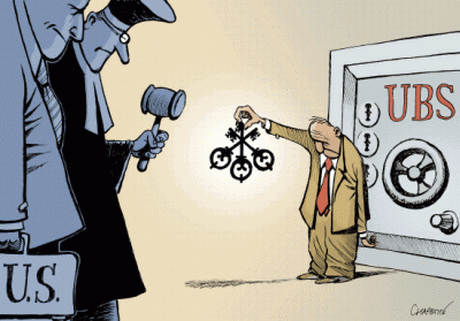The Philippine banking system is out of luck. Trust is the key component of the social capital deficit that saps Philippine society of the substance and conviction needed to do things properly and aspire to greatness. Even as the honourable statesmen of the Philippine government debate its definition, the broader swath of Philippine society consistently fail to grasp even its most fundamental underpinnings.

Given the moral quandary the impeachment court trying Chief Justice Renato Corona faces having potentially found itself in a situation where ill-gotten evidence had made its way into the proceedings, the only recourse it seems is to OPEN Pandora’s box and subject ALL to scrutiny under the same terms — which is to institutionalise the proverbial “small lady†in the way we investigate graft and corruption amongst Filipino politicians.
| SUPPORT INDEPENDENT SOCIAL COMMENTARY! Subscribe to our Substack community GRP Insider to receive by email our in-depth free weekly newsletter. Opt into a paid subscription and you'll get premium insider briefs and insights from us. Subscribe to our Substack newsletter, GRP Insider! Learn more |
In a Get Real Post comment Domingo Arong, elaborates further:
I’m more interested in the term “trust,†which–like loyalty, hate or love–is a feeling, an emotion, difficult to measure, quantify or even define with certainty; and this means that the definition of the impeachable offense of “betrayal of public trust†is simply how at least one-third of the incumbent Members of the House of Representatives construe the term to mean and two-thirds of the Senate concur to convict.
Hence, in the absence of a definitive meaning–and, more importantly, since the accusers are the officers solely empowered under the Constitution to define what the term “betrayal of public trust†connotes–I think the only fair, reasonable and conclusive way to determine what constitutes “betrayal of public trust†(at least insofar as CJ Corona’s SALN is concerned) is by COMPARISON–by comparing the manner in which the SALNs of the accused were accomplished with the SALNs the accusers (Rep. Tupas, in particular) submitted (together, of course, with the accompanying bank and related financial documents verifying the consistency and truthfulness of the SALNS both contending parties submitted).
This way, Pandora, and not just the “shadowy small lady,†would reveal–from the very SALNs of officers authorized to define the term “betrayal of public trustâ€â€“what,after all, are to be included or excluded in the SALN of public officers.
Run for the banks!
A remotely related precedent to this is in the way the United States strong-armed Swiss Bank Union Bank of Switzerland (UBS) into an “accord” requiring them to hand over information on more than 4,000 American clients suspected of tax evasion in mid-2009…
While it is unclear how many names will be released, the agreement could result in scores of wealthy Americans with offshore accounts having their identities revealed to the Internal Revenue Service. Many could face charges of tax evasion as well as big fines and back taxes.
This was after a long battle waged by UBS together with the Swiss government against the US Department of Justice’s efforts to crack their fabled bank secrecy laws.

Bank secrecy (or bank privacy) is a legal principle in some jurisdictions under which banks are not allowed to provide to authorities personal and account information about their customers unless certain conditions apply (for example, a criminal complaint has been filed). In some cases, additional privacy is provided to beneficial owners through the use of numbered bank accounts or otherwise. Bank secrecy is prevalent in certain countries such as Switzerland, Singapore, Lebanon and Luxembourg, as well as offshore banks and other tax havens under voluntary or statutory privacy provisions.
Created by the Swiss Banking Act of 1934, which led to the famous Swiss bank, the principle of bank secrecy is always considered one of the main aspects of private banking. It has also been accused by NGOs and governments of being one of the main instruments of underground economy and organized crime, in particular following the class action suit against the Vatican Bank in the 1990s, the Clearstream scandal and the terrorist attacks of September 11, 2001. Former bank employees from banks in Switzerland (UBS, Julius Baer) and Liechtenstein (LGT Group) have testified that their former institutions helped clients evade billions of dollars in taxes by routing money through offshore havens in the Caribbean and Switzerland. One of these, Rudolf M. Elmer, wrote, “It is a global problem…Offshore tax evasion is the biggest theft among societies and neighbor states in this world.”
[Photo courtesy WorldMeets.us. Parts of this article were lifted from the Wikipedia.org article “Bank secrecy†in a manner compliant to the terms stipulated in the Creative Commons Attribution-ShareAlike 3.0 Unported License that governs usage of content made available in this site.]
benign0 is the Webmaster of GetRealPhilippines.com.
Some lessons SHOULD be learned the hard way. If it will cost the economy particularly the banking sector brought about by idiotic decisions of our leaders, so be it. That will make people mature to realize what they have voted for.
i totally agree with you.
meanwhile should i head for my bank? should we be scared? what are the probabilities that bank runs will occur due to this idiocy? do filipinos actually care enough (or know enough, for that matter) about this to actually head for their banks?
i have read tweets that fil-chi businessmen may threaten to withdraw (sorry, don’t know how to link tweets in my timeline of several days ago) their money and then do business by LC. possible?